A group of youths read Koran as they wait to break the fast during the holy month of Ramadan inside Istiqlal mosque in Jakarta, Indonesia: photo by Beawiharta/Reuters, 9 June 2016
A group of youths read Koran as they wait to break the fast during
the holy month of Ramadan inside Istiqlal mosque in Jakarta, Indonesia: photo by Beawiharta/Reuters, 9 June 2016
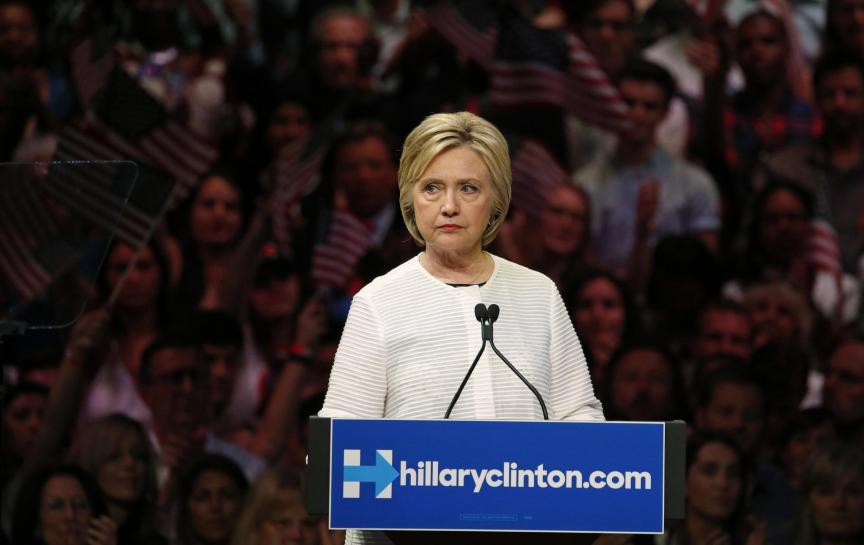
Emails in Clinton probe dealt with planned drone strikes: WSJ: image via Reuters Top News @Reuters, 9 June 2016
Democratic presidential candidate Sen. Bernie Sanders walks with President Barack Obama through the Colonnade as he arrives at the White House for an Oval Office meeting. Sanders met with President Obama after Hillary Clinton has clinched the Democratic nomination for president.: photo by Alex Wong, 9 June 2016
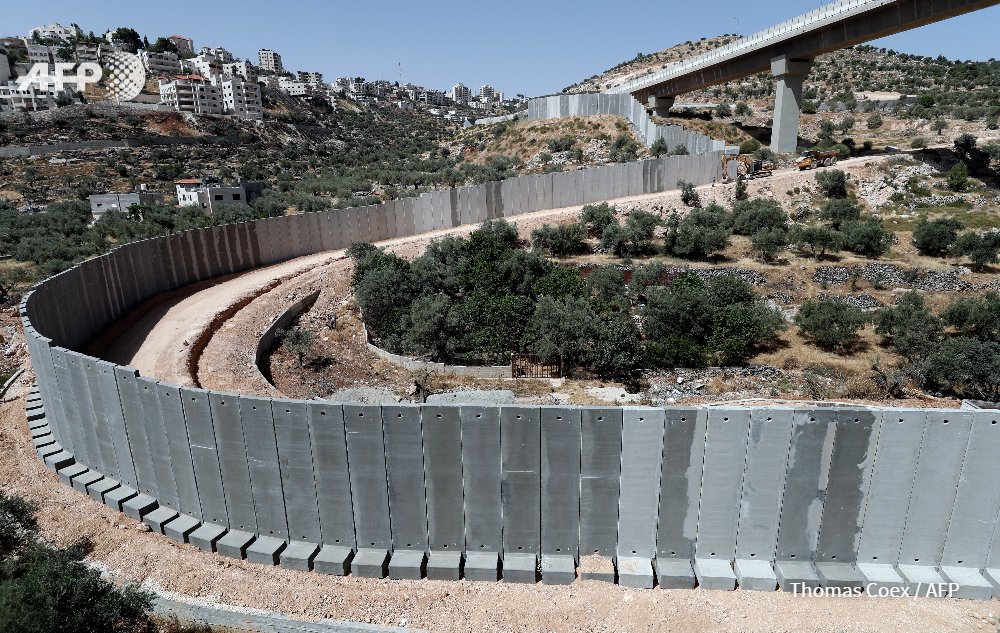
#Palestinian #Israel A new section of the separation concrete barrier near Beit Jala #AFP Photo by @TomCOEX: image via Aurelia BAILLY @AureliaBAILLY, 7 June 2016

An Israeli soldier in the West Bank village of Yatta on Thursday. The military said residents would not be allowed to enter or leave the village: photo by Hazem Bader/Agence France-Presse, 9 June 2016

An Israeli soldier in the West Bank village of Yatta on Thursday. The military said residents would not be allowed to enter or leave the village: photo by Hazem Bader/Agence France-Presse, 9 June 2016
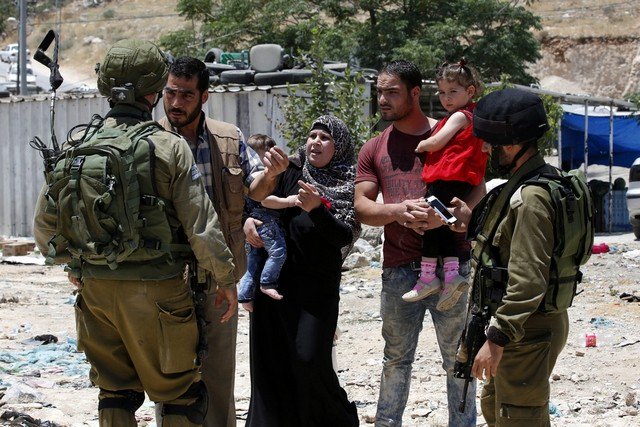
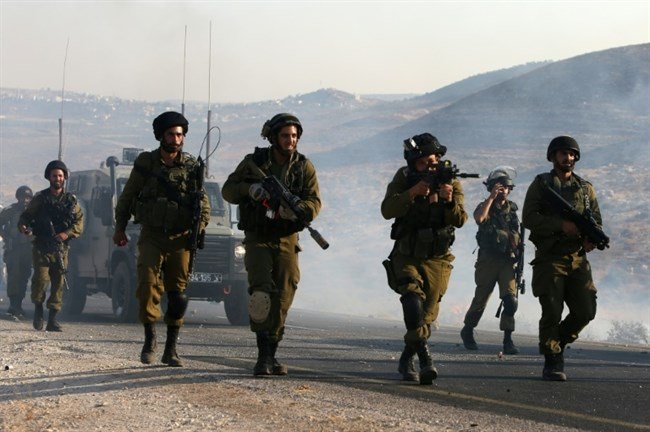

Israeli soldiers at a checkpoint on Thursday outside the West Bank town of Yatta: photo by Hazem Bader/Agence France-Presse, 9 June 2016

Israeli soldiers at a checkpoint on Thursday outside the West Bank town of Yatta: photo by Hazem Bader/Agence France-Presse, 9 June 2016
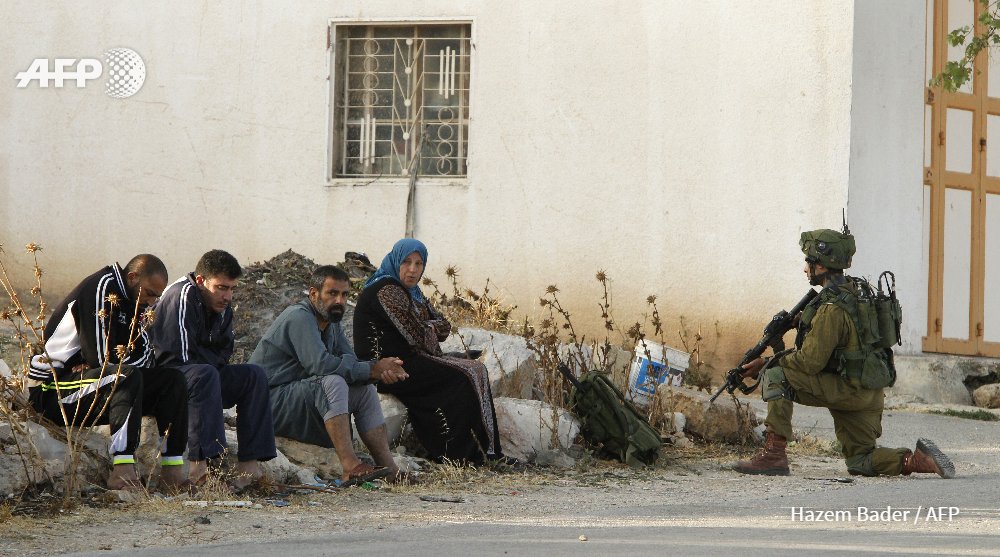
An Israeli soldier keeps watch as #Palestinians sit nearby after the army entered #Yatta #AFP Photo by @hazemjbader1: image via Frédérique Geffard @fgeffardAFP, 9 June 2016
A Palestinian worker at a beachside coffeehouse decorates its terrace with hanging colourful umbrellas as part of decorations for the Muslim holy fasting month of Ramadan in Gaza City: photo by Mohammed Abed/AFP, 9 June 2016

A Palestinian worker at a beachside coffeehouse decorates its terrace with hanging colourful umbrellas as part of decorations for Ramadan in Gaza City: photo by Mohammed Abed / AFP, 9 June 2016
A Palestinian worker at a beachside coffeehouse decorates its terrace with hanging colourful umbrellas as part of decorations for the Muslim holy fasting month of Ramadan in Gaza City: photo by Mohammed Abed/AFP, 9 June 2016
Production of suffering
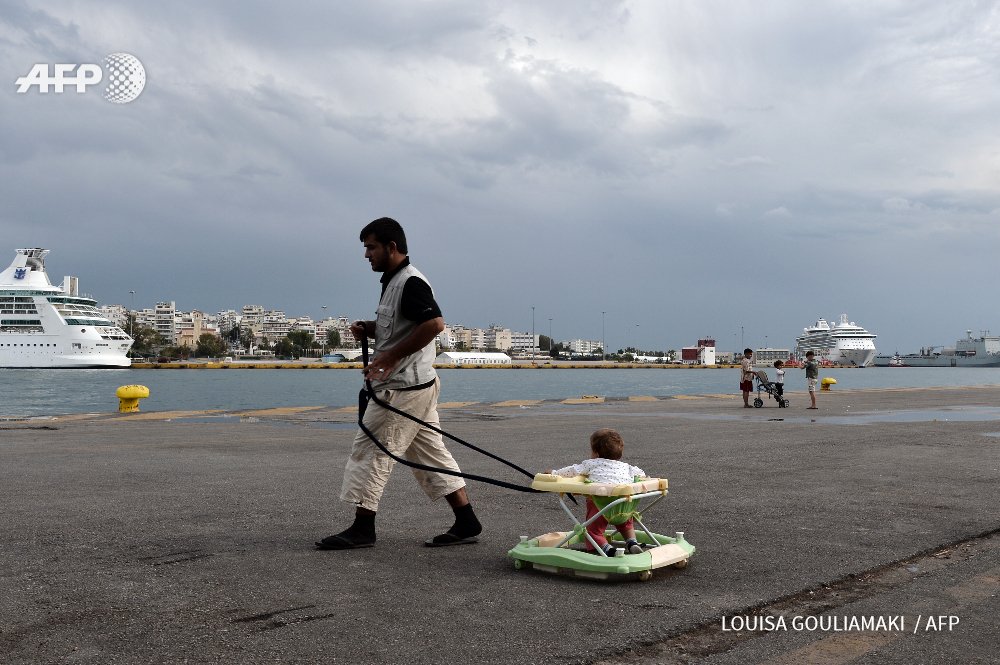
GREECE - A refugee drags his baby in a baby walker at the port of Piraeus in Athens. By @lgouliam #AFP: image via Frédérique Geffard @fgeffardAFP, 8 June 2016
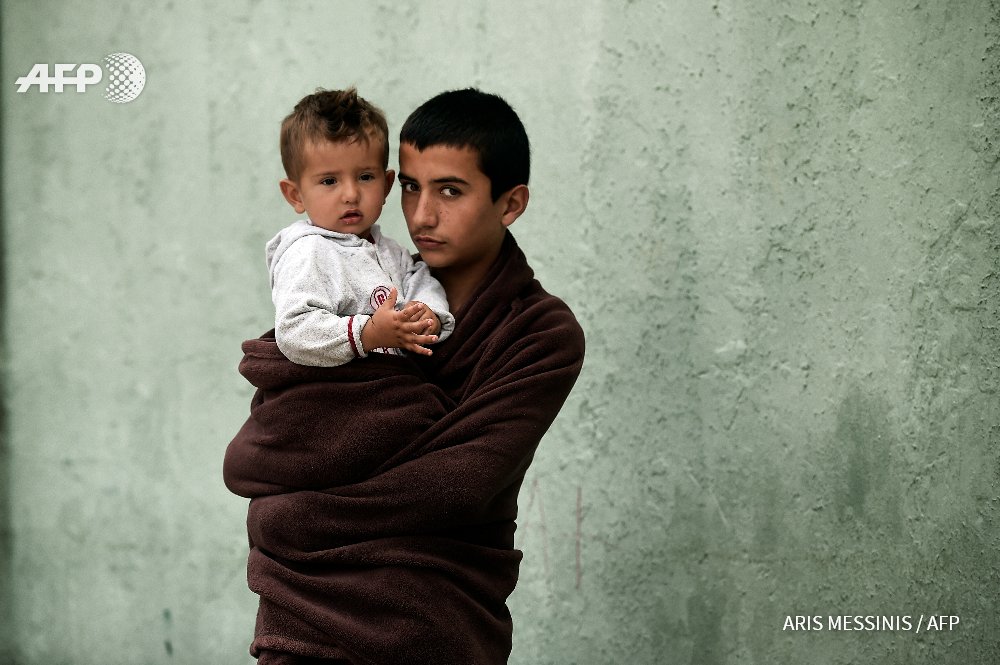
GREECE - A young Afghan boy holds his brother at the refugee camp of Schisto in Athens. By @ArisMessinis #AFP: image via Frédérique Geffard @fgeffardAFP, 8 June 2016
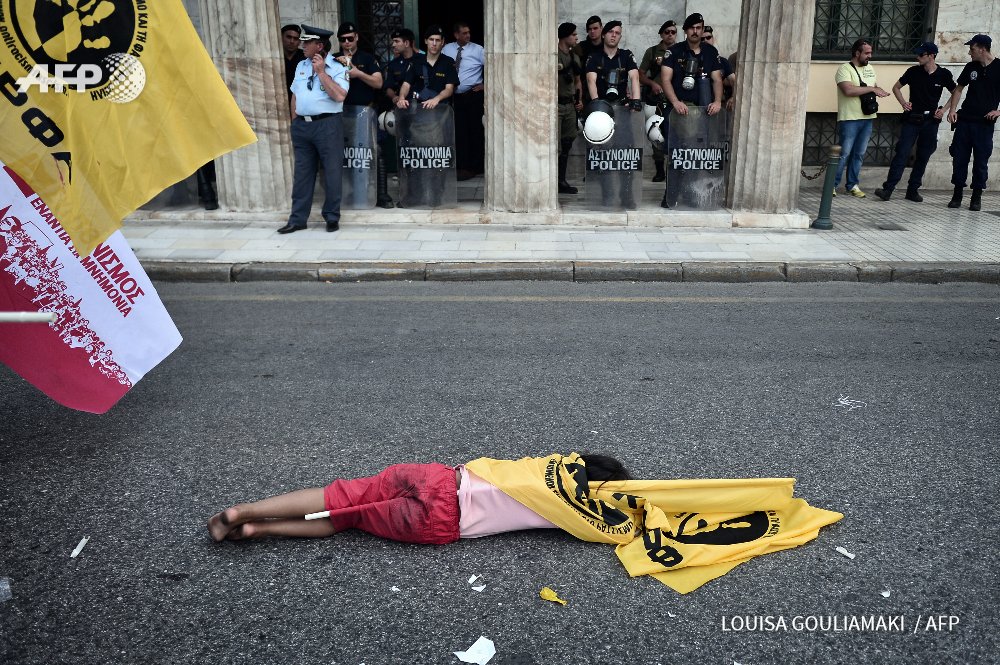
GREECE - Refugee children demonstrate to call for greater rights for refugees in Athens. By @lgouliam #AFP: image via Frédérique Geffard @fgeffardAFP, 9 June 2016

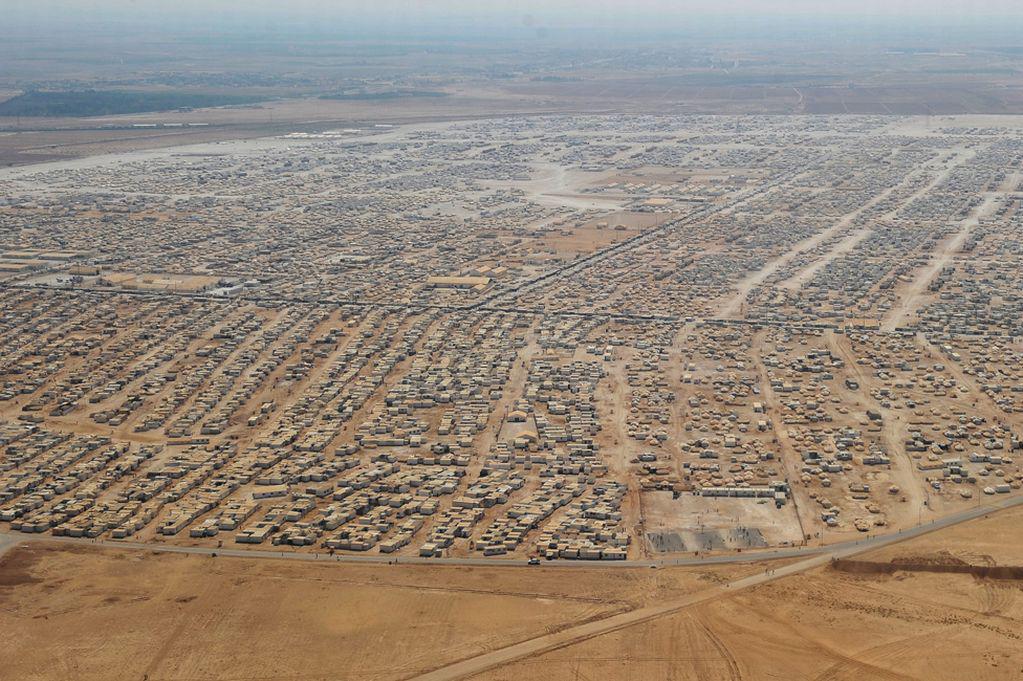
Syria 2008: 2nd in the world for refugees hosted. 2015: 1st in the world for refugees produced.: image via The Int'l Spectator @intlspectator, 29 May 2016
Palpable and immediate global abstract and acute local national Despair and collective Debt
Nor to the left remaining however as always dwarf-supremely more or less
Confident in the negative certainty that there's nobody else out there worth counting
And you O my soul turning and turning in the empty world where you stand surrounded
In measureless oceans of benumbed dead space bereft of feeling dumbly

A Cambodian resident wearing a mask attends a ceremony at Pring Ka-Ek village on the outskirts of Phnom Penh, Cambodia. Villagers organise a ceremony to continue their local traditions by paying respect to the Neakta Pring Ka-Ek (Spirit house) to prevent them from diseases and to achieve abundant rice harvests and other agricultural yields.: photo by Mak Remissa / EPA, 9 June 2016

Hildebeest: Warhawk

Emails in Clinton probe dealt with planned drone strikes: WSJ: image via Reuters Top News @Reuters, 9 June 2016
Commentary: Hillary Clinton’s foreign policy problem: Amir Handjani, Reuters, 9 June 2016
This
week, Hillary Clinton made history by becoming the first female nominee
for president of a major American political party. In doing so, she
fended off a serious threat from Vermont Senator Bernie Sanders, a
self-proclaimed socialist who has become a titanic force in the
Democratic Party.
Sanders has challenged Democratic orthodoxy on free trade, Middle East policy and the scope of executive power to conduct unlimited military campaigns under the auspices of the war against terrorism. In doing so he has exposed one of Clinton’s greatest vulnerabilities in a general election: Her judgment when conducting foreign affairs.
Clinton’s record as a military hawk is well-known. She voted for the Iraq War as a senator. As secretary of state, she pushed for U.S. intervention in Libya and lobbied President Obama to take military action against Bashar al-Assad in Syria. She was lukewarm about the nuclear deal with Iran. With respect to Israel, in March she gave a major policy speech to the American Israel Public Affairs Committee (AIPAC) without so much as mentioning the plight of the Palestinians –- a point later highlighted by Sanders, a son of Jewish immigrants, during their debate in Brooklyn.
Progressives, independents and liberal democrats who have been voting in large numbers for Sanders hold the keys for Clinton to defeat Donald Trump. If Clinton is to consolidate her support among these important constituencies, she must reassure them that despite her record, she is willing to follow in President Obama’s footsteps and not seek military solutions to every vexing foreign policy problem.
To be sure, Clinton’s hawkish instincts fall within the mainstream of the foreign policy establishment. Yet in this election year she faces two problems. First, in the past two national elections, the Democratic base has embraced President Obama’s foreign policy doctrine, loosely defined as emphasizing negotiation and collaboration rather than confrontation and unilateralism. Sanders has projected a similar view of the United States’ role in the world.
Second, Clinton’s opponent in the general election, Donald Trump, has consistently conveyed a message that America is taking on too much of a burden in providing global security for its allies and not receiving enough of the commercial benefit. This argument has gained traction in a Republican Party that increasingly sees endless military campaigns in the Middle East as a drain on American blood and treasure. Thus, Clinton’s reliance on hard power as a means of advancing American interests is a tough sell in an election year where voters seem to prefer retrenchment rather than military adventurism.
Rather than embrace President Obama’s foreign policy of military restraint, Clinton signaled in a major foreign policy address last week that she would be doubling down on the conflict in Syria by imposing a no-fly zone -- something the Obama administration has ruled out for fear of deepening America’s involvement in the Syrian civil war and risking escalation with Russia and Iran, the Assad government’s main patrons.
Furthermore, Clinton has proclaimed that she would reaffirm her “unbreakable bond” with Israeli Prime Minister Benjamin Netanyahu. Fidelity to Israel’s security is a staple of all presidential campaigns, but Clinton has gone on record embracing an Israeli prime minister who repeatedly embarrassed President Obama, tried to torpedo his signature foreign policy achievement -– the Iran nuclear deal -– and paid only lip service to the peace process with Palestinians.
Such positions put her at odds with Sanders’ supporters, who, like President Obama, are committed to Israel’s security but also recognize the tremendous toll the occupation and continued expansion of Israeli settlements take on American security interests in the Middle East and on Palestinian society. They would like to see the United States play a more evenhanded role. So far, Clinton has not shown any willingness to confront more hard-line Israeli policies that make peace harder to achieve.
To defeat Trump, Clinton must not revert back to the U.S. foreign policy status quo, which is grounded in the theory that military force and intervention hold the key to peace and prosperity -- and has brought little in the way of either. During the more than two decades that U.S. forces have been engaged in military action in the Middle East, militancy and instability have increased, not decreased.
President Obama, to his credit, charted a different course. His insistence on negotiating with Iran, a longtime adversary, produced a landmark nuclear agreement –- something that seemed inconceivable when President George W. Bush occupied the White House. Clinton needs to show that she is equally comfortable exercising restraint, and that she understands the limits of U.S. power as well as its effectiveness –- an understanding that forms the bedrock of the world view embraced by Sanders and Obama supporters.
Sanders has challenged Democratic orthodoxy on free trade, Middle East policy and the scope of executive power to conduct unlimited military campaigns under the auspices of the war against terrorism. In doing so he has exposed one of Clinton’s greatest vulnerabilities in a general election: Her judgment when conducting foreign affairs.
Clinton’s record as a military hawk is well-known. She voted for the Iraq War as a senator. As secretary of state, she pushed for U.S. intervention in Libya and lobbied President Obama to take military action against Bashar al-Assad in Syria. She was lukewarm about the nuclear deal with Iran. With respect to Israel, in March she gave a major policy speech to the American Israel Public Affairs Committee (AIPAC) without so much as mentioning the plight of the Palestinians –- a point later highlighted by Sanders, a son of Jewish immigrants, during their debate in Brooklyn.
Progressives, independents and liberal democrats who have been voting in large numbers for Sanders hold the keys for Clinton to defeat Donald Trump. If Clinton is to consolidate her support among these important constituencies, she must reassure them that despite her record, she is willing to follow in President Obama’s footsteps and not seek military solutions to every vexing foreign policy problem.
To be sure, Clinton’s hawkish instincts fall within the mainstream of the foreign policy establishment. Yet in this election year she faces two problems. First, in the past two national elections, the Democratic base has embraced President Obama’s foreign policy doctrine, loosely defined as emphasizing negotiation and collaboration rather than confrontation and unilateralism. Sanders has projected a similar view of the United States’ role in the world.
Second, Clinton’s opponent in the general election, Donald Trump, has consistently conveyed a message that America is taking on too much of a burden in providing global security for its allies and not receiving enough of the commercial benefit. This argument has gained traction in a Republican Party that increasingly sees endless military campaigns in the Middle East as a drain on American blood and treasure. Thus, Clinton’s reliance on hard power as a means of advancing American interests is a tough sell in an election year where voters seem to prefer retrenchment rather than military adventurism.
Rather than embrace President Obama’s foreign policy of military restraint, Clinton signaled in a major foreign policy address last week that she would be doubling down on the conflict in Syria by imposing a no-fly zone -- something the Obama administration has ruled out for fear of deepening America’s involvement in the Syrian civil war and risking escalation with Russia and Iran, the Assad government’s main patrons.
Furthermore, Clinton has proclaimed that she would reaffirm her “unbreakable bond” with Israeli Prime Minister Benjamin Netanyahu. Fidelity to Israel’s security is a staple of all presidential campaigns, but Clinton has gone on record embracing an Israeli prime minister who repeatedly embarrassed President Obama, tried to torpedo his signature foreign policy achievement -– the Iran nuclear deal -– and paid only lip service to the peace process with Palestinians.
Such positions put her at odds with Sanders’ supporters, who, like President Obama, are committed to Israel’s security but also recognize the tremendous toll the occupation and continued expansion of Israeli settlements take on American security interests in the Middle East and on Palestinian society. They would like to see the United States play a more evenhanded role. So far, Clinton has not shown any willingness to confront more hard-line Israeli policies that make peace harder to achieve.
To defeat Trump, Clinton must not revert back to the U.S. foreign policy status quo, which is grounded in the theory that military force and intervention hold the key to peace and prosperity -- and has brought little in the way of either. During the more than two decades that U.S. forces have been engaged in military action in the Middle East, militancy and instability have increased, not decreased.
President Obama, to his credit, charted a different course. His insistence on negotiating with Iran, a longtime adversary, produced a landmark nuclear agreement –- something that seemed inconceivable when President George W. Bush occupied the White House. Clinton needs to show that she is equally comfortable exercising restraint, and that she understands the limits of U.S. power as well as its effectiveness –- an understanding that forms the bedrock of the world view embraced by Sanders and Obama supporters.
Democratic presidential candidate Sen. Bernie Sanders walks with President Barack Obama through the Colonnade as he arrives at the White House for an Oval Office meeting. Sanders met with President Obama after Hillary Clinton has clinched the Democratic nomination for president.: photo by Alex Wong, 9 June 2016

#Palestinian #Israel A new section of the separation concrete barrier near Beit Jala #AFP Photo by @TomCOEX: image via Aurelia BAILLY @AureliaBAILLY, 7 June 2016

An Israeli soldier in the West Bank village of Yatta on Thursday. The military said residents would not be allowed to enter or leave the village: photo by Hazem Bader/Agence France-Presse, 9 June 2016

An Israeli soldier in the West Bank village of Yatta on Thursday. The military said residents would not be allowed to enter or leave the village: photo by Hazem Bader/Agence France-Presse, 9 June 2016

#Israel cracks down on Palestinians with sweeping 'collective punishment' measures #Yatta: image via The National World @TheNatWorld, 9 June 2016
“We might be the only country in the
world where another nation is under occupation without civil rights
(....) You can’t hold people in a situation of occupation and hope
they’ll reach the conclusion everything is alright.”
Tel Aviv mayor Ron Huldai, speaking to Army Radio, 9 June 2016

Israeli forces deploy two additional army battalions in #WestBank: image via Ma'an News Agency @MaanNewsAgency, 9 June 2016

Israeli soldiers at a checkpoint on Thursday outside the West Bank town of Yatta: photo by Hazem Bader/Agence France-Presse, 9 June 2016

Israeli soldiers at a checkpoint on Thursday outside the West Bank town of Yatta: photo by Hazem Bader/Agence France-Presse, 9 June 2016

An Israeli soldier keeps watch as #Palestinians sit nearby after the army entered #Yatta #AFP Photo by @hazemjbader1: image via Frédérique Geffard @fgeffardAFP, 9 June 2016
A Palestinian worker at a beachside coffeehouse decorates its terrace with hanging colourful umbrellas as part of decorations for the Muslim holy fasting month of Ramadan in Gaza City: photo by Mohammed Abed/AFP, 9 June 2016

A Palestinian worker at a beachside coffeehouse decorates its terrace with hanging colourful umbrellas as part of decorations for Ramadan in Gaza City: photo by Mohammed Abed / AFP, 9 June 2016
A Palestinian worker at a beachside coffeehouse decorates its terrace with hanging colourful umbrellas as part of decorations for the Muslim holy fasting month of Ramadan in Gaza City: photo by Mohammed Abed/AFP, 9 June 2016
Production of suffering

GREECE - A refugee drags his baby in a baby walker at the port of Piraeus in Athens. By @lgouliam #AFP: image via Frédérique Geffard @fgeffardAFP, 8 June 2016

GREECE - A young Afghan boy holds his brother at the refugee camp of Schisto in Athens. By @ArisMessinis #AFP: image via Frédérique Geffard @fgeffardAFP, 8 June 2016

GREECE - Refugee children demonstrate to call for greater rights for refugees in Athens. By @lgouliam #AFP: image via Frédérique Geffard @fgeffardAFP, 9 June 2016

Survivors of death until further notice
Aleppo
Ph: Baraa Al Halabi: image via baraa al halabi @baraaalhalabi, 9 June 2016

Syria 2008: 2nd in the world for refugees hosted. 2015: 1st in the world for refugees produced.: image via The Int'l Spectator @intlspectator, 29 May 2016
Torn Web
Palpable and immediate global abstract and acute local national Despair and collective Debt
Misery all across the board sick inequity dusty concrete overpass barrenness everywhere
As a lost nation staggers through another election season looking neither to the left
Throwing out your filaments till the ductile anchor hold but it won't won't won't

Spiral orb webs showing some colours in the sunlight in a gorge in Karijini National Park, Western Australia, Australia: photo by Bjørn Christian Tørrissen, 28 November 2008

The body of Damien Cionzynski lay inside a gas station after he was fatally shot about 5 a.m. on Saturday in the Dunning community of Chicago: photo by Whitney Curtis for The New York Times, 28 May 2016

.

Spiral orb webs showing some colours in the sunlight in a gorge in Karijini National Park, Western Australia, Australia: photo by Bjørn Christian Tørrissen, 28 November 2008

The body of Damien Cionzynski lay inside a gas station after he was fatally shot about 5 a.m. on Saturday in the Dunning community of Chicago: photo by Whitney Curtis for The New York Times, 28 May 2016

.
The
body of Damien Cionzynski lay inside a gas station after he was fatally
shot about 5 a.m. on Saturday in the Dunning community of Chicago: photo by Whitney Curtis for The New York Times, 28 May 2016

A Cambodian resident wearing a mask attends a ceremony at Pring Ka-Ek village on the outskirts of Phnom Penh, Cambodia. Villagers organise a ceremony to continue their local traditions by paying respect to the Neakta Pring Ka-Ek (Spirit house) to prevent them from diseases and to achieve abundant rice harvests and other agricultural yields.: photo by Mak Remissa / EPA, 9 June 2016

A Cambodian villager paints his face during a traditional ceremony on the outskirts of Phnom Penh. Pring Ka-ek villagers organise an annual traditional ceremony to pray to their ancestor Neakta Pring Ka-ek (Spirit house) to help them to protect their homes and animals as well as to make rain fall during the rice planting season.: photo by Tang Chhin Sothy / AFP, 9 June 2016
A man convicted in connection with a riot in Gujarat in 2002, looks
out from a police van outside of a court before a hearing in Ahmedabad,
India: photo by Amit Dave/Reuters, 9 June 2016
A man convicted in connection with a riot in Gujarat in 2002, looks out from a police van outside of a court before a hearing in Ahmedabad, India: photo by Amit Dave/Reuters, 9 June 2016
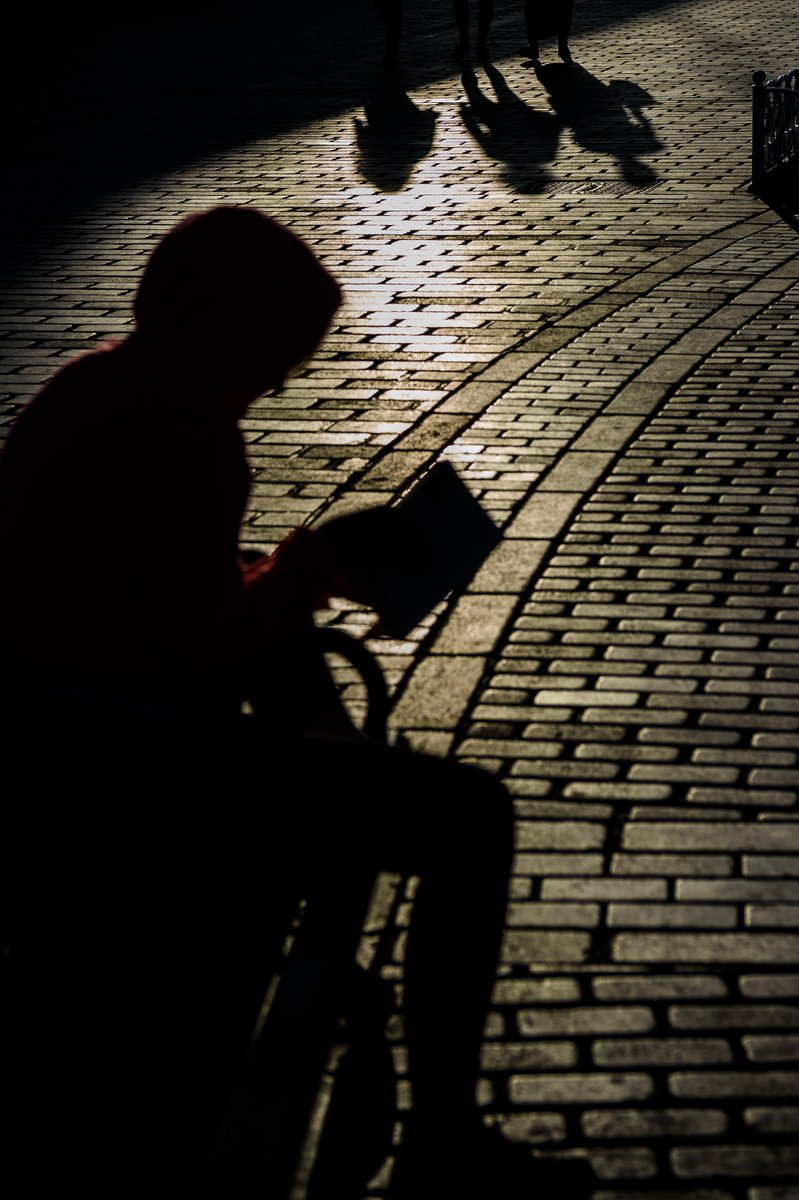
TURKEY - A woman reads a book on a bench as people walk in the Blue mosque district in Istanbul: image via Frédérique Geffard @fgeffardAFP, 9 June 2016
A Sadhu or Hindu holy man walks on the banks of the river Ganges during a dust storm in Allahabad, India: photo by Jitendra Prakash/Reuters, 9 June 2016
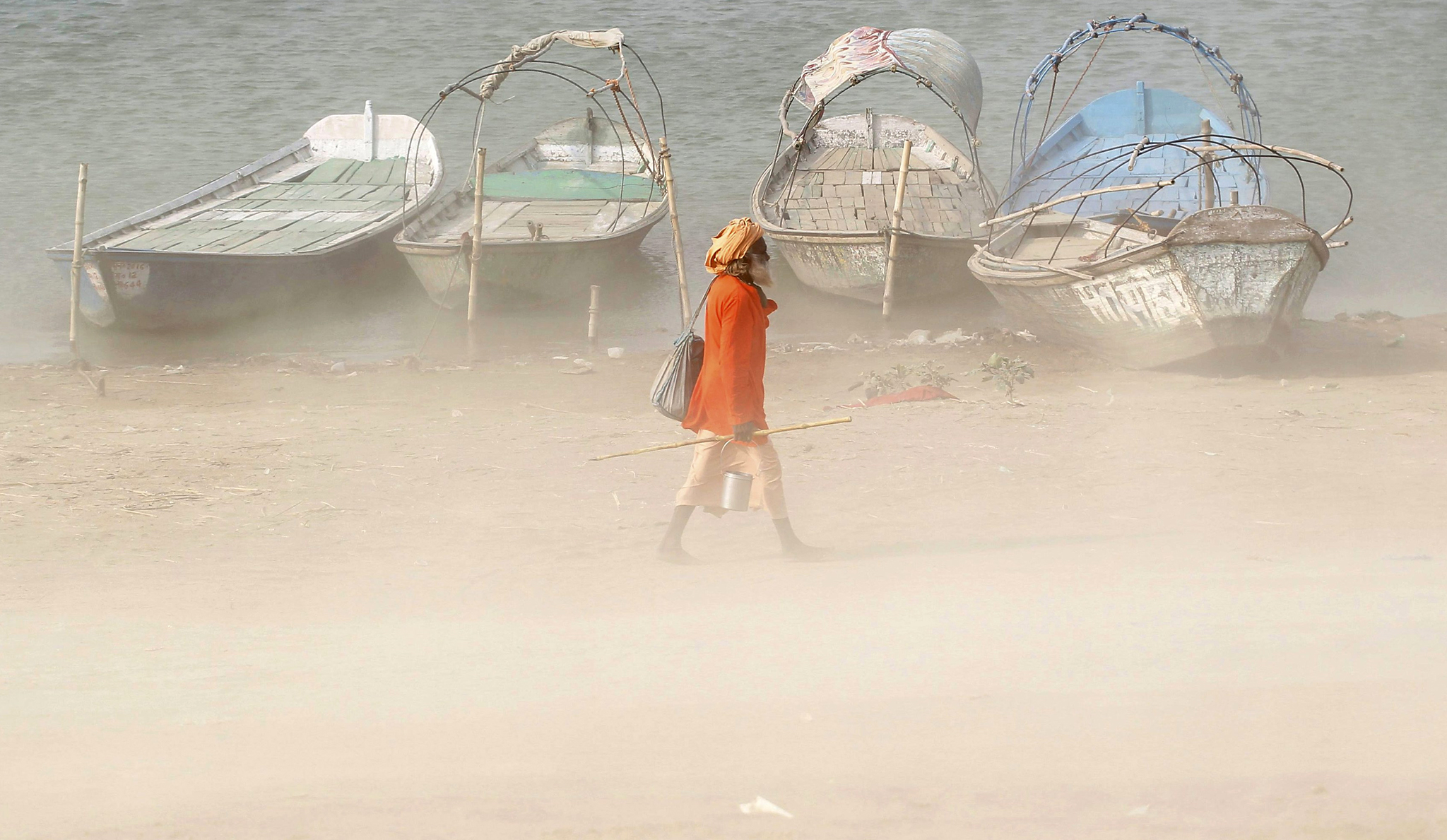
A Sadhu or Hindu holy man walks on the banks of the river Ganges during a dust storm in Allahabad, India: photo by Jitendra Prakash/Reuters, 9 June 2016
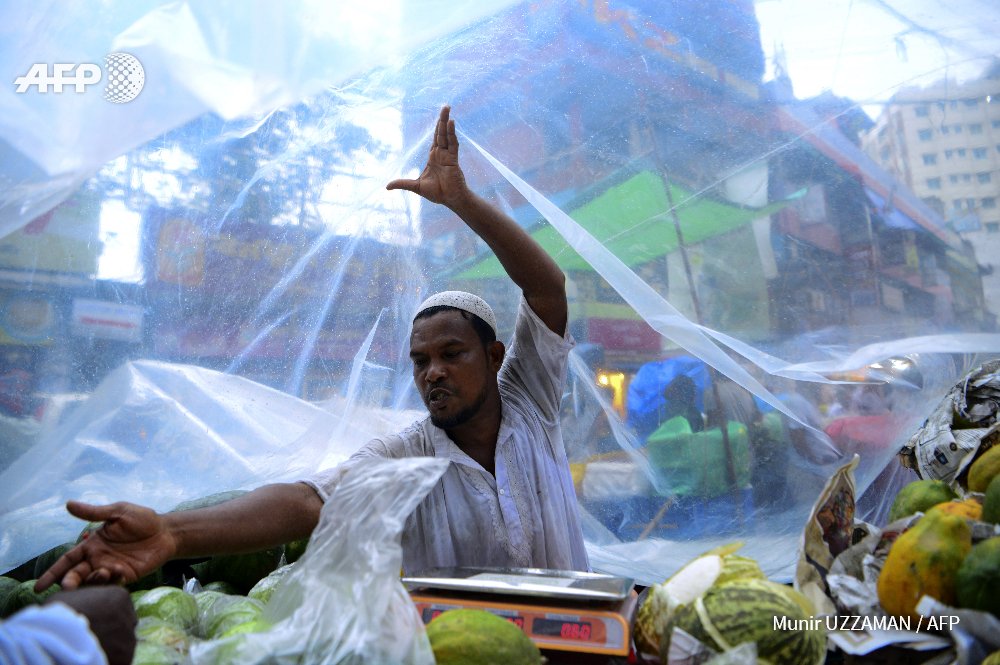
A Bangladeshi fruit vendor props up plastic shelter over his street stand during downpour in Dhaka @AFP: image via AFP Photo Department @AFP, 7 June 2016

Women read the Quran during the holy month of Ramadan at a mosque on the outskirts of Jakarta, Indonesia: photo by Tatan Syuflana / AP, 9 June 2016
A survivor looks for his family members at the scene of a deadly suicide car bomb attack in the New Baghdad neighborhood of Baghdad, Iraq: photo by Hadi Mizban/AP, 9 June 2016
A survivor looks for his family members at the scene of a deadly suicide car bomb attack in the New Baghdad neighborhood of Baghdad, Iraq: photo by Hadi Mizban/AP, 9 June 2016
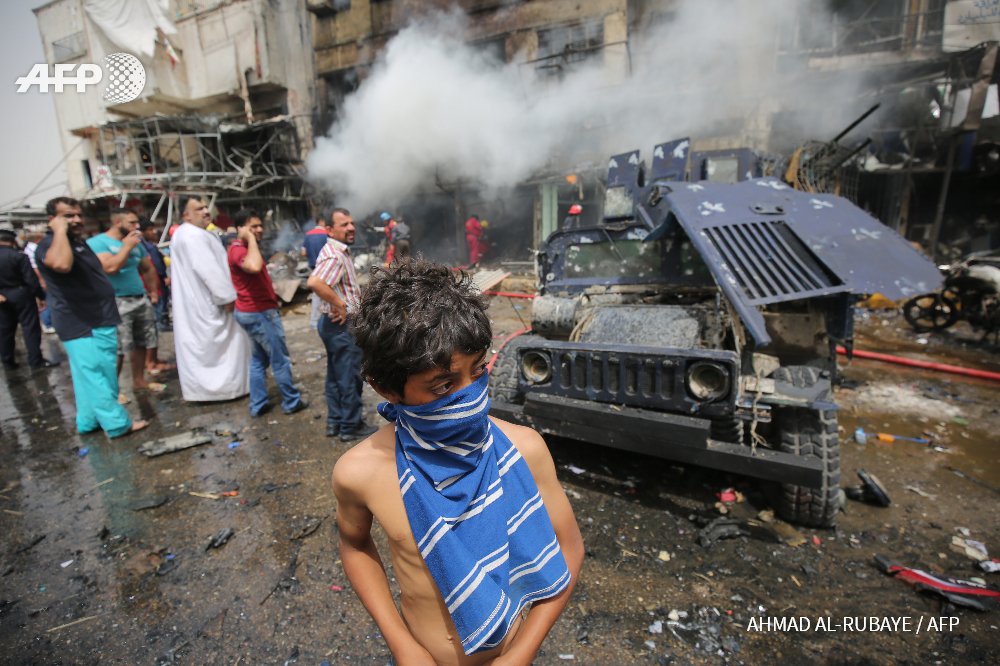
IRAQ - Iraqis check the scene of car bomb attack in Shiite neighbourhood Jadida in Baghdad. By Ahmad Al-Rubaye #AFP: image via AFP Photo Department @AFP, 9 June 2016
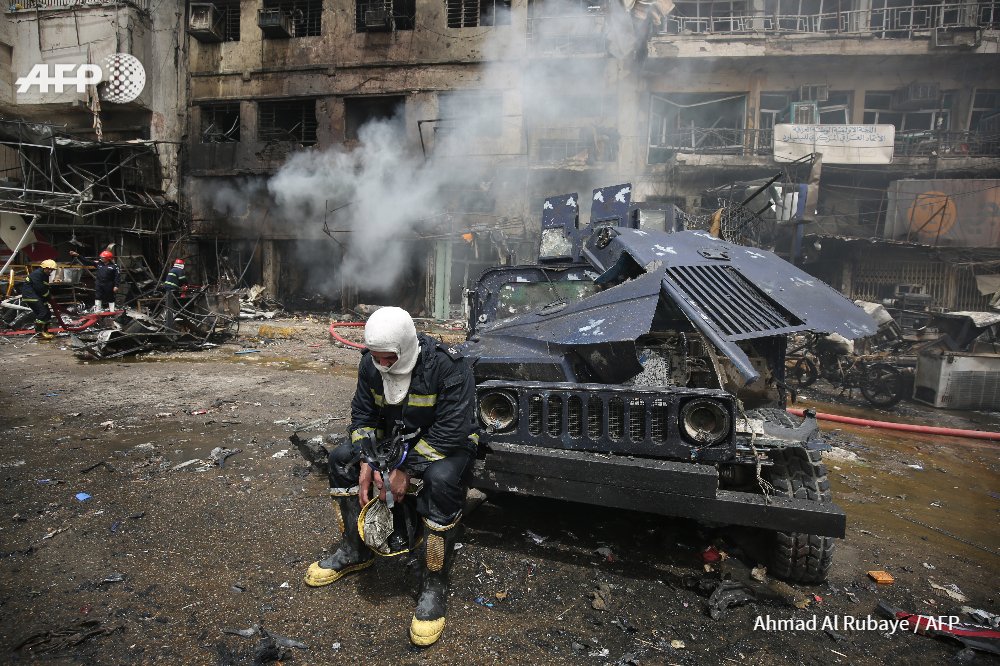
#Iraq A fireman sits at the site of car bomb attack in #Baghdad #AFP Photo by Ahmad Al Rubaye: image via Aurelia BAILLY @AureliaBAILLY, 9 June 2016
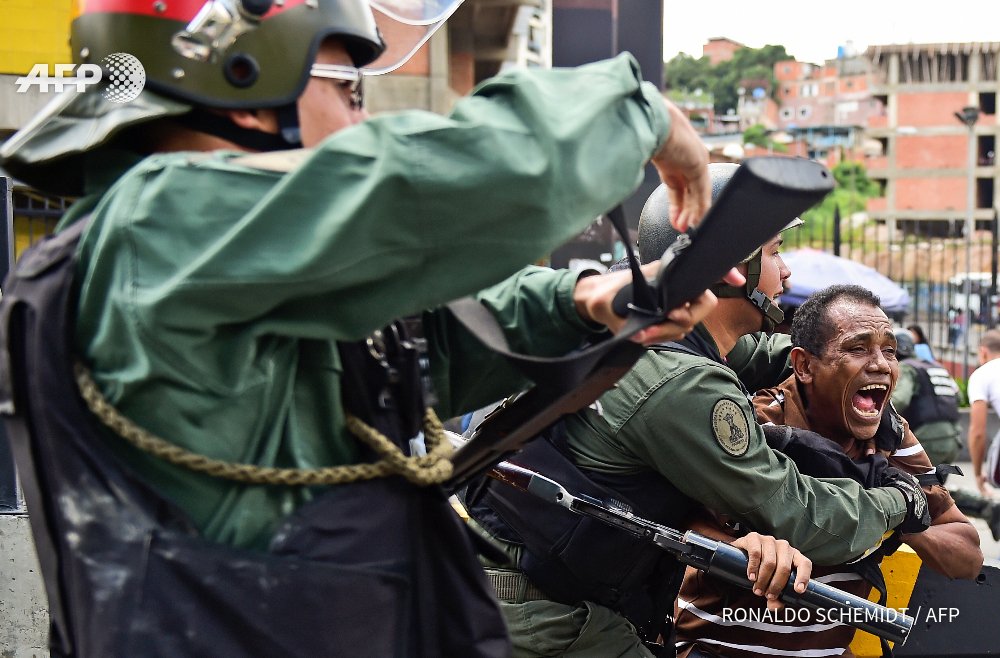
National Guard clashes with citizens protesting against the severe food and medicine shortages #Caracas By @rschemidt: image via AFP Photo Department @AFPphoto, 8 June 2016
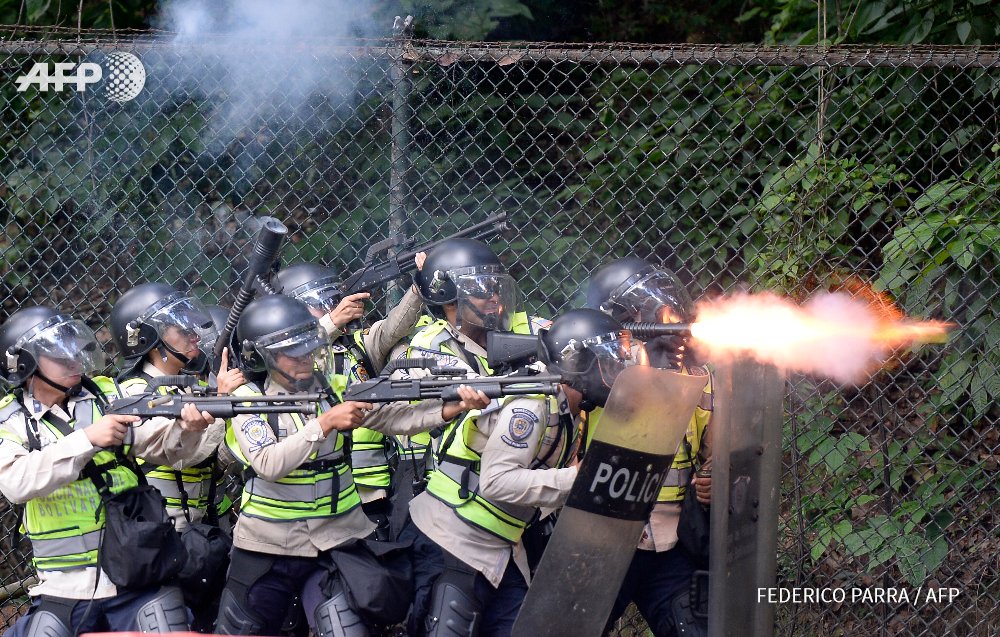
VENEZUELA - Demonstration in demand of referendum on removing President Nicolas Maduro in Caracas. By @federicoparra: image via Frédérique Geffard @fgeffardAFP, 9 June 2016

#Iraq A fireman sits at the site of car bomb attack in #Baghdad #AFP Photo by Ahmad Al Rubaye: image via Aurelia BAILLY @AureliaBAILLY, 9 June 2016

National Guard clashes with citizens protesting against the severe food and medicine shortages #Caracas By @rschemidt: image via AFP Photo Department @AFPphoto, 8 June 2016

VENEZUELA - Demonstration in demand of referendum on removing President Nicolas Maduro in Caracas. By @federicoparra: image via Frédérique Geffard @fgeffardAFP, 9 June 2016

A worshipper reads the Quran at the Mohammed Al-Amin Mosque in downtown Beirut after the afternoon prayer during the holy month of Ramadan: photo by Benjamin Cremel / AFP, 9 June 2016
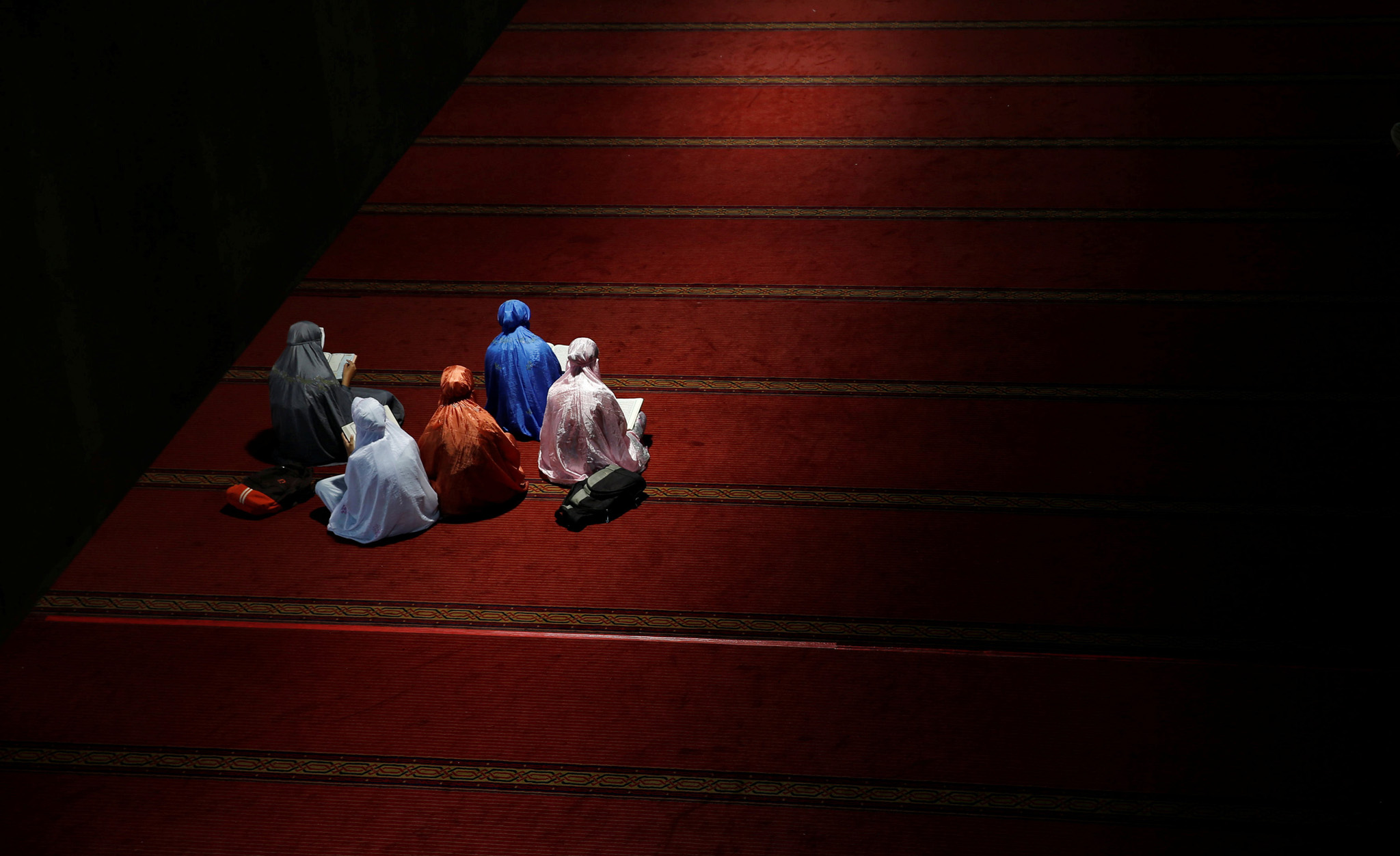


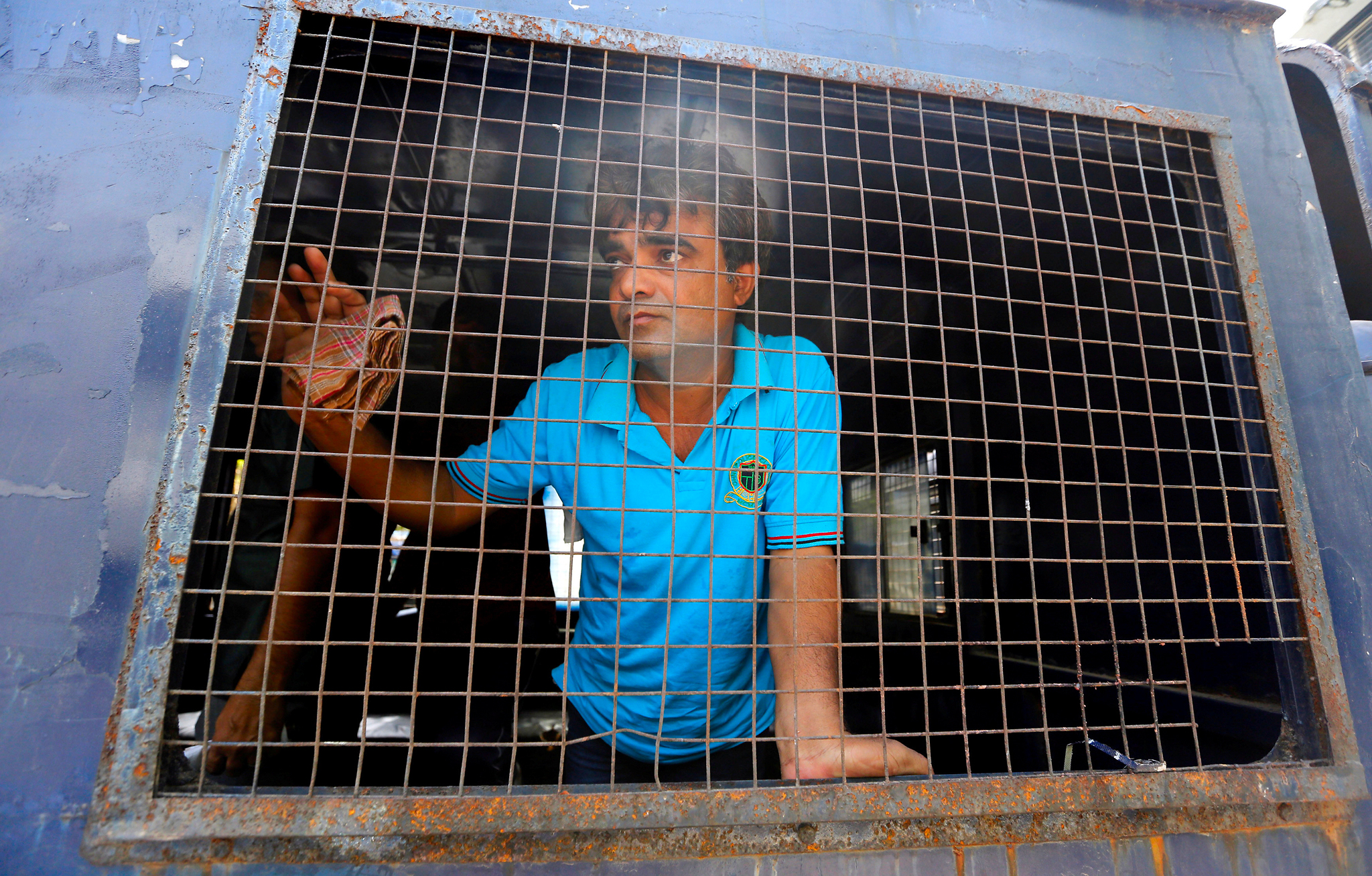




This colourful umbrella thing is breaking out all over. An umbrella street appeared in central Bath last week, but I haven't found out if it commemorates Ramadan.
ReplyDeleteConfident in the negative certainty
ReplyDeleteNow there's the burning eye of the Yanqui shitstorm.
Michael,
ReplyDeleteWould this be the Bath outbreak of which you speak?
Duncan,
ReplyDeleteHadn't seen that.
Any colourful umbrella streets up your way then?
(Talking of yanqui... The overhead parasol displays intentionally or not resembling the protective netting in streets beneath the settlement citadels in Hebron...)